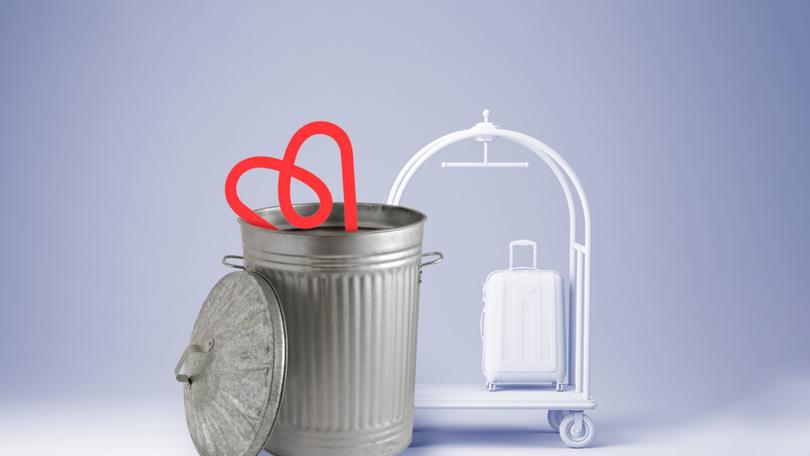KATE EMERY: I’m breaking up with you, Airbnb. And could you take yourself to the curb when you check out?

Seventeen years after San Francisco roommates Joe Gebbia and Brian Chesky looked in their empty loft and saw, not the miscellaneous junk and terrifyingly huge spiders lurking in the unused corners of most homes, but a $140 billion idea, Australian politicians are still grappling with Airbnb.
The Victorian Government’s so-called “Airbnb tax” hasn’t come into effect yet and it’s already causing headaches.
On one side it’s getting dumped on by those, including the Greens, who say the 7.5 per cent levy is too little to have an effect. On the other side are those, including landlords, who say it’s too much and will likely be passed onto guests anyway.
Sign up to The Nightly's newsletters.
Get the first look at the digital newspaper, curated daily stories and breaking headlines delivered to your inbox.
By continuing you agree to our Terms and Privacy Policy.The NSW Government is still chewing through submissions to its discussion paper, which proposed further restrictions on the sector, including potentially capping the number of days a property can be used for short-stay accommodation.
And increasingly I am of the view that governments are powerless to deal with the real trouble with Airbnb, which is that the experience of using it is becoming just a bit rubbish.
This column is not being sponsored by Big Hotel — I can only wish that unmarked bills wrapped in fluffy white bathrobes were being thrust upon me in poorly-lit carparks or complimentary toiletries deposited in my letterbox under cover of night.
Instead, it’s being sponsored by my recent attempt to find short-term accommodation in Sydney and Melbourne and my slow realisation that a hotel might be the better choice for my holiday plans.
For a millennial in 2024, opting for a hotel over an Airbnb feels wrong, like phoning a friend instead of texting, maintaining a CD tower in my living room or relying on in-person meet-cutes to get a date. And yet.
Turns out that Sydney CBD apartment recommended on Airbnb for my family of four at $1694 for six nights is only one bedroom and will require my husband and I to arm-wrestle our kids to see who gets the bed and who gets the pull-out sofa. I’m not worried: my kids are young and I can take them but I’d rather shell out the extra $300 for a hotel room with two double beds and a courtyard.
If it’s more space I need then surely $2517 for a two bedroom apartment is the ticket? Except, reviews suggest the keys need to be picked up and dropped off at a second location half an hour away, which seems like a bleak way to book-end a family vay cay. More importantly, the hosts operate a one towel per person policy which, for a family of four for a week means that, at some point, I’ll be stepping out of a hot shower into a damp, smelly towel and hoping my youngest has dramatically improved her bum-wiping game.
Yes, these examples are absolutely cherry-picked. Probably there are, if I look hard enough, some great value Airbnbs out there that don’t require me to launder a bunch of towels mid-holiday.
But the bad Airbnb stories do seem to keep piling up: the dirty ones, the catfishing ones and, increasingly it seems, the hosts who seem to believe guests represent an exciting new source of free labour.
To plug #Airbnb into social media is to take a trip through dirty sheets, unwashed floors and outdoor furniture that’s been thoroughly Jackson Pollocked by the local bird population.
There’s the Aussie friends in Paris who turned up to what they thought was their accommodation, only to find themselves on a construction site, having been sent the wrong address by their host. When they found the right place, the key didn’t work. Bon voyage!
There’s the woman whose Rockdale Airbnb came with some unadvertised extras, like mould, an unexplained mattress on the floor and inoperable air-conditioning. All that and an owner who was “constantly messaging” and “made me send more money”.
Then there’s the trend for Airbnb hosts to ask more and more of their guests. It starts with “just take the rubbish out when you leave”, escalates to “can you stack and run the dishwasher?” Before you know it, you’re washing the sheets to remake the beds and replacing any toilet rolls, paper towels and rubbish bags that you use. Yes, these are all actual examples, taken from guests’ online gripes and reviews.
If I wanted to do housework I’d start with my own.
Hotels have their drawbacks but at least they’re not rationing my towels and asking if I mind running the vacuum before checkout. That and the ability to talk to a person face-to-face if something goes wrong, not send an email into the ether and hope the host is as addicted to their phone as I am.
Whether or not this kind of bad press is to blame, short-stay listings in Australia are down more than 15 per cent on pre-pandemic numbers.
Maybe some of that is down to the cost-of-living crisis, which means we’re too busy buying food and paying our electricity bills to shell out for a mini break. Maybe higher interest rates being passed along have made Airbnb less financially appealing than when Mr Gebbia and Mr Chesky shelled out for a trio of airbeds.
Or maybe I’m not the only grumpy sod out there who doesn’t want to scroll through pages of reviews to find accommodation where cleanliness is a given, not a perk, who wants the right to as many towels as my body — and bathing schedule — requires and who feels, deep down, that having someone else take care of the tedious domestic stuff is half the point of getting away from home.
